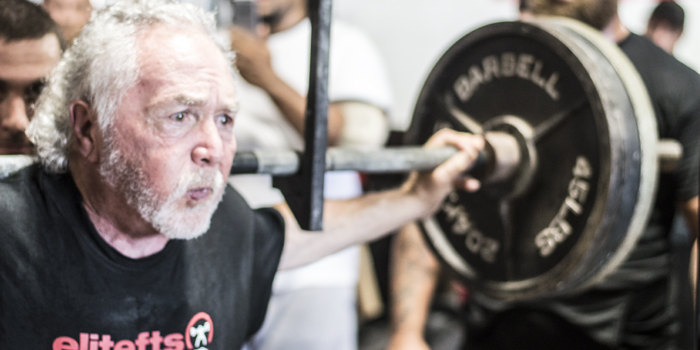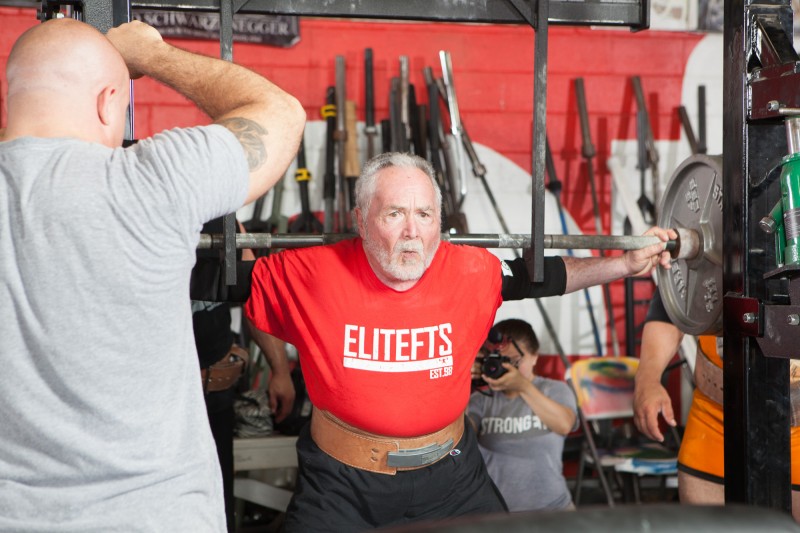
Thank you. Thank you. Thank you to all who had occasion to read last month’s article. Thank you, too, for all the nice comments made on this site and on other social media sites.
In that article, I asked if any of my elitefts colleagues to do a study or if a study exists on whether or not we can build muscle and get stronger as seniors. I decided to address the topic myself.
Understand, however, that I do not have a degree in any of the physical education sciences. My degrees are in the fields of history and law. I do not have the testing ability or the sample size necessary for a peer-reviewed article in a PhD journal. However, I am not writing a peer-reviewed article for a PhD article. I am writing about individuals I have trained, observed, and my own experience. So as not to keep you in suspense, I’ll tell you now that it is my hypothesis that we can build muscle and strength after 50.
I discussed seniors and strength training in an article published on this site on March 24, 2017. In it, I explained that we all begin to lose muscle in our third decade. Additionally, we all begin to lose bone density in our fourth decade, especially post-menopausal women who are not on hormone therapy. That is why we often think of seniors as brittle-boned people that break easily in a fall. However, studies have shown that both muscle loss and bone density loss can be prevented by resistance training. A major contributor to both muscle loss and bone density is lack of exercise and a sedentary lifestyle. The best news is that bone density and muscle loss can be recaptured by resistance training.
It is, therefore, never too late to begin and an imperative for seniors to begin. To say, “I’m too old to start going to the gym” is garbage. Age is a reason to go to the gym! An analogy used by Mark Rippatoe resonates with me. He said, “ That from 18 to 25, we swim with the current; from 25 to 40, we swim in a lake; and from 40 on, we swim upstream.” Of course, the older we get, the greater the current.

There are, of course, impediments to building muscle after 50. As men age, their testosterone levels decrease, making it more difficult to build muscle. Harder, however, does not mean impossible. With testosterone therapy, proper nutrition, the right training program, and the determination to a purpose, we can absolutely build muscle and strength.
Do we eat better or worse as seniors? We certainly have the knowledge to eat better. However, with children gone, we too often don’t take the time to make nutritious meals. It’s not rocket science to eat better and cleaner. High protein intake is essential for muscle growth. Lean meat, fish, eggs, or dairy along with healthy fats can help us grow muscle and strength.
We must, however, caution our trainees that this is a marathon and not a sprint. I had one lady quit training after one month because she couldn’t see her gains. The other three flourished throughout the year and are still training.
The slings and arrows of outrageous fortune (i.e., a misspent youth, sports injuries, physical labor stress, inherited joint issues combined with a sedentary lifestyle, and the daily necessities of life) combine to keep us out of the gym. If we want to be more faithful to those obligations, we need to get our collective asses to the gym. It will keep us around longer to fulfill those obligations. Take the time to get stronger — you will live longer!
My own personal experience involves training five women in their 50s and observation of one other. Sharing experiences with my sister, who is 72 and has had both knees replaced and has done CrossFit for a number of years.
With men, it involves training three men in their 70s (including myself), one who is now 86 and another who is 65. I’ve also trained younger men and woman whose results are not a consideration in this article.
I began with two women in their very early 50s. Both had been very active as young people but had succumbed to a sedentary lifestyle. As we know, beginners progress very quickly, and they were no exception. With the use of multiple joint exercises (squat, bench and deadlift), their progress skyrocketed. I asked one of them how much weight she had lost after a few months. She said, “None, but I am two dress sizes smaller.”
As we exchange information, my sister (72) does those CrossFit exercises that she can do. Her replaced knees are like magic. Her strength has improved such that she could compete in powerlifting with her deadlift.
The other lady (50-ish) is an avid bodybuilder. Lately, she has tried powerlifting and has set PR after PR in all her lifts.
WATCH: C.J. Murphy's Specialty Bar Car Show #1
With regard to the men, I have trained three men in their 70s — myself included. I trained my brother (75) a few years ago for about six months. He came with back issues and a kind of shuffle in his walk. After our six months together doing powerlifting-inspired exercises, he walked straighter, stood straighter, and had more energy to do more things. I wish I could have kept him at it.
I had another gentleman who came to me after some heart issues. He wanted to get stronger. Indeed he did get stronger and we had to add weight to the bar on a regular basis. After about eight months, he was diagnosed with prostate cancer. He was given medication that reduced his testosterone level to zero. Nevertheless, he worked harder with a great deal of grit and determination and got even stronger. I have written about my friend and client from the ‘70s. He is now 86 and trained with me for about five years. We started when he was walking with a cane and now he is playing golf. He has had both knees and both shoulders replaced. We worked around those issues and he became unquestionably stronger. He still trains regularly using the program we developed, and I check with him regularly on his progress and encourage him to increase his weights.
I have been training a man who just turned 65. He has been an on-again, off-again gym goer. He came to try to regain some lost strength. His progress has been so great, and the powerlifting culture in our gym has so affected him that he is competing in his first powerlifting meet on February 2nd. His goal is to establish a bar that he must exceed in future meets.
Then there is me, a little old man who is an orthopedic nightmare. My numbers have only gone up since I began to compete. Stronger? Probably, but also better technique and more knowledge. I have to exceed the best of previous meets. As long as I do that, I am satisfied.
I belong to a number of sites on social media that involve seniors in bodybuilding and powerlifting. I have seen examples of tremendous progress in building muscle and gaining strength. I do not, however, cite those because all of my examples are of people I have trained or observed. They do, however, bolster my hypothesis. Can we build muscle and gain strength after 50? My answer is ABSOLUTELY.











Your article, as always, is interesting and informative. As you have found in your training, and by training others in the 60 and over age group, there is strength potential to be realized in our age group. I still love training after 45+ years of doing so, and my training is still structured around the big 4 (5/3/1: SQ, BP, DL and Press). At 72 I still look forward to going in to the gym, maybe more than ever, and maybe because at this point days (and workouts) are gifts.
Keep the articles coming.
Best wishes for continued good health,
Joe
I did indeed return to the platform after two years. Yesterday, 2/16, I lifted in the Orlando Barbell APF Florida State Championship and I had a great time. I had a great coach Al Reiss who is very experienced and knowledgeable, but more importantly a loyal friend. I lifted as a 70-75 lifter in the 90KG class and went 8 for 9 (numbers not important, maybe laughable!).
Be well,
Joe
I've enjoyed training with you for a while now, I've been challenged to do more and I've seen quite a lot of progress with your marathon style of training. I've learned to be patient and to keep at it and I will.